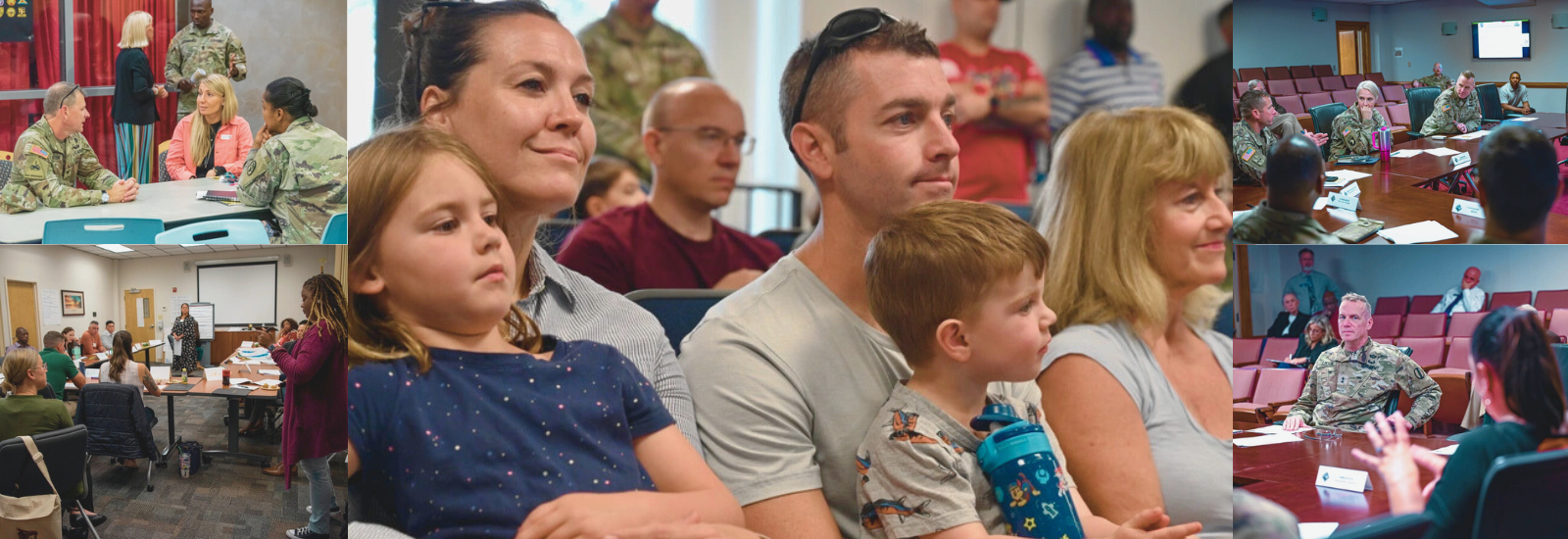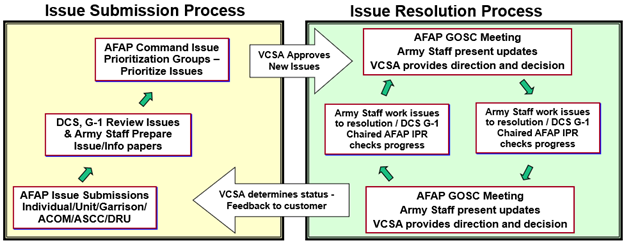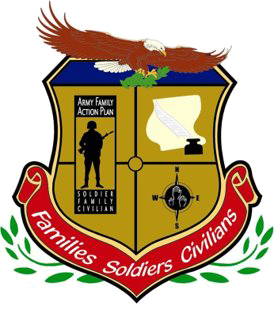
Army Family Action Plan
AFAP is a grassroots process where Soldiers, Families, Survivors, Retirees, and Civilians identify, prioritize and elevate their well-being issues to the Army Senior Leaders for action and resolution. Established in 1983 and codified in the AR 608-1 and AFAP Charter, the VCSA and SMA hold a bi-annual General Officer Steering Committee (GOSC) Meeting where Army Staff present updates on active issues, discuss challenges, and receive guidance on way forward.
AFAP Dashboard
AFAP GOSC Executive Summary
Resources
Governance
Question and Answer
How many submitted issues have resulted in improvements?
Since 1983, over 800 issues have been raised at the Department of the Army level – and those have resulted in over 500 improvements for Soldiers, Families and Army communities.
What’s the purpose of the program?
AFAP is an Army grassroots program that engages Soldiers, Family members, Survivors, Retirees, and Department of the Army Civilians across all Army Components to identify, prioritize, and elevate quality of life issues that cannot be resolved by their command and requires HQDA resolution.
How does the AFAP process work?
- At the installations, garrisons hold an AFAP issue-generating forum at any time during the year to solicit QOL issues.
- Additionally, at the ACOM, ASCC, DRUs, ARNG and USAR, the customer (Army People) can submit issues using their process to the Commander.
- New issues enter the AFAP via a three-tier grassroots process that prioritizes and elevates quality of life issues created and selected by Army constituents.
- Issues are resolved via a process that tasks resolution of issues, reviews action plans and progress, and directs courses of action.
AFAP Issue Submission and Issue Resolution Process is a continuous cycle – see diagram below
AFAP Issues are generated at the grassroots level.

Can you explain the AFAP process in more detail?
- A quality-of-life issue facing Soldiers, Army Civilians, Families, Survivors, and Retirees that cannot be resolved by the command and requires HQDA resolution
- Ongoing throughout the year
- HQDA collect new issues NLT 15 March of every year
- AFAP Issue generating forum(s). Examples: Town Halls, Focus Groups, Army Teen Panel, Command Courses, Conferences, etc.…
- Issue Management System (IMS)
- Command Teams
- ASLs
- Engage and support the AFAP Process
- Review and Validate issues received
- If issue can be resolved at their level – work issue to resolution
- If issue cannot be resolved at their level – elevate to next level
- Issues elevated to HQDA are issues that cannot be resolved by Commanders and Senior Leaders
- Soldier Support
- Family Support
- Military Health Care
- Civilian Support
- Retiree Support
- Survivor Support
- Caregiver Support
- Army staff research the issue and provide an information paper.
- HQDA AFAP packages these papers and sends to AFAP GOSC Commands for prioritization.
- Comprised of AFAP GOSC member commands with a demographic representation
- Prioritizes issues
- Those results are submitted to HQDA AFAP where we tally these results
- Top 21 issues (3 from each category) forwarded to the AFAP GOSC and VCSA for review and decision
- AFAP GOSC is conducted twice a year
- Joint Department of Defense Committee review board to ensure AFAP issues are thoroughly worked to resolution by the appropriate functional proponent.
- DCS, G-1: Hosts
- VCSA: Chair - Provides courses of action, direction, and decision
- Discussion:
- Army staff proponents present updates on Active issues
- Army staff GOSC members asked to respond at the enterprise level
- Command representatives asked to respond based on their constituents
- Verbatim transcript by court reporter validates comments
- Final issue status: Determined by the VCSA
- Active (VCSA may direct new course of action or end product)
- Complete (Issue resolved - recommendation or “best solution” attained)
- Unattainable (After a three-year “hold” issue can be elevated to HQDA AFAP again)
- Like the AFAP process – continuous – the feedback or communication to the Soldier, Retiree, Family Member, Civilian and Survivor is critical part of the AFAP.
In depth view of the AFAP process:
What is an AFAP issue -
AFAP Issue submission -
New issues are generated through -
Commander and Senior Leader Role -
AFAP Issues are categorized into Seven areas -
HQDA AFAP validates issues and sends to responsible HQDA proponent -
Command Prioritization Groups – The Army People -
New Issues -
AFAP GOSC -
Feedback -
The AFAP Program has been in existence for many years. Why is there still a need for AFAP?
- Army Chief of Staff GEN John A. Wickham signed a ground breaking “white paper” titled The Army Family on August 15, 1983, identifying the need for the Army to its Families. GEN Wickham and his staff asserted that a healthy Family environment allows Soldiers to concentrate more fully on their mission.
- GEN Wickham recognized that this represented a break with past tradition and formed the basis for the development of an Army Family Action Plan.
- AFAP was created in 1980 through focus groups but was fully developed with the first official AFAP Conference held in July 1983. Its mission is to help Army leaders address the needs and concerns of the total Army Family.
- Later in 2003, then CSA GEN Shinseki, once again referred to the importance of AFAP.
- As long as we have an Army…and we have Army people… there will be a need for AFAP.
- Like in 1983 – current Army leaders recognize that the importance of AFAP to address the needs and concerns of the Army People.
- The Army is going to continue to change as the world changes. Legislation will change. DoD guidance will change. Army Regulations will need to change. Procedures will need to change… and with that it will be more important than ever to have a trusted and prove process for the Army People to submit issues that are affecting their quality of life and readiness.
History Lesson -
What are some of the more recent notable achievements/accomplishments that have been realized through the AFAP program?
- Law & policy change authorized reimbursement for pet relocation expenses for a single household.
- Law & policy change allowed Military Family Life Consultants to provide counseling services regardless of the state where they live.
- Authorized Military ID cards for Surviving Military Dependents under the age of 10.
- Increased maximum time allowed for Final Home of Station selection for Surviving Dependent FMs from 3 to 6 years.
- Authorized an indefinite ID card for Military Spouses aged 65 and older.
- Allowed military spouses to take up to 365 days leave without pay (LWOP) to retain a presence in the federal government.
- Allowed installation AER Level 1 approving officials to provide funds to cover essential needs of domestic violence victims.
- License reciprocity – nationwide acceptance of professional licensing for military spouses and spouses of civilian employees.
- Program where volunteers provide casualty assistance support for Survivors of retired Soldiers.
- Enterprise E-EFMP system to increase communication and support to Soldiers and Families.
- Casualty Assistance Officer (CAO) App - providing consolidated content to assist CAOs.
Since 1983, AFAP issues have been instrumental in driving legislative action, policy changes, and improved programs and services. Some of the most recent changes are:
Legislative Changes:
Policy Changes:
Improved Programs and Services:
Other programs were originally modeled on AFAP (i.e., SHARP Program Improvement Forum), but didn’t have the same staying power. Why do you think that’s the case?
- Grassroots program – addresses the demands of Army Life
- Proven tool that communicates issues of importance to Army Senior Leaders
- Recognized program that demonstrates to the Army People that Army Leaders Care
- Army Senior Leaders have recognized the importance of and supported AFAP.
AFAP has remained as the Voice of the Army People. It is the ONLY program or venue in the Army where a Soldier, Family Member, Civilian, Retiree or Survivor can submit an issue and trust that their voice will be heard at every echelon of command and addressed by Army Senior Leaders.
What is the value of the Army Family Action Plan to the Army?
- Voice of the Army
- Grass roots perspective of adjustments and improvements that will increase recruitment, retention, work-life satisfaction, readiness
- Tool to communicate to leader's issues of importance.
- Demonstrates that Army leaders care about the people who make up the Army – Soldiers, Department of the Army Civilians, Retirees, Survivors, and their Families
- Addresses the demands of Army life by identifying and resolving quality of life “hot spots” as the Army continues to transform and builds and sustains combat ready formations
AFAP supports the Army goals by -
Is AFAP relevant?
-
High visibility/broad impact AFAP issues
- Distribution of Montgomery GI Bill (MGIB) Benefits to Dependents
- Family Readiness Group Support Assistants (FRSA) Positions
-
Low-cost AFAP issues with a high quality of life return
- Convicted Sex Offender Registry
- Family Care Plan Provider and Non-DEERs Survivor Access to Installations
- Paternity Leave for Soldiers
- Creation of Family Readiness Groups (FRGs)
- Creation of Better Opportunities for Single Soldiers (BOSS)
-
Timely/relevant AFAP issues
- Shortage of Providers in Military Treatment Facilities (MTFs)
- Availability of Authorized TRICARE Providers
- Traumatic Brain Injury (TBI) Rehabilitation Program
-
Issues that create parallels to civilian standards of living
- In-state College Tuition
- Audio/Video Surveillance in Childcare Centers
AFAP addresses Issues across the Army -
Does the recent realignment to DCS G-1 impact the AFAP program? If so, how?
Yes! It is a force multiplier. AFAP has historically been aligned with Family Programs. The realignment of DPRR to DCS G-1 increases our footprint, area of influence and resources available.
What are the most important takeaways about the AFAP Program?
- Grassroots process that addresses the demands of Army life by identifying and resolving quality of life issues that affect the readiness of the Army People.
- Proven tool that communicates issues of importance to Army Senior Leaders
- Recognized program that demonstrates to the Army People that Army Leaders Care
Voice of the Army People
When is the next AFAP GOSC meeting?
2026 Winter AFAP GOSC: 26 Feb 1300-1500 EDT
2026 Summer AFAP GOSC: 2 Sep 1430-1630 EDT
